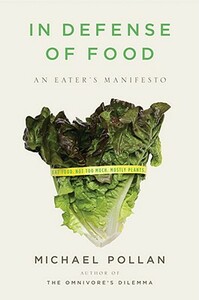Take a photo of a barcode or cover
Look, I like him, but an issue with narrative science books are that any argument made tends to be weak if there isn’t evidence provided. It’s just a fun story at that point.
The part that had me involved changes in nutrients of food over time. Has agricultural practices impacted nutrition? Yes, but so has climate change. Can we argue climate change is exasperated by commercial agricultural practices? Yes, but that’s not something discussed at all. There’s an irony to say those people are ignoring data while also ignoring data.
The part that had me involved changes in nutrients of food over time. Has agricultural practices impacted nutrition? Yes, but so has climate change. Can we argue climate change is exasperated by commercial agricultural practices? Yes, but that’s not something discussed at all. There’s an irony to say those people are ignoring data while also ignoring data.
"In Defense of Food asks us to ponder the simple question of how we humans managed to feed ourselves for thousands of years, yet now struggle more than ever to nourish ourselves with readily available foods. As a journalist, not a nutritional scientist, nor a government agency, author Michael Pollan is able to look at the broader historical, social and political picture of food in America. Through this lens, Pollan is able to defend “real food – the sort of food our great grandmothers would recognize as food” against many of the “edible foodlike substances” that exist on the market.
While certainly a stark reality, Pollan is not a pessimist. In fact, he provides his simple solution to the problem at hand within the first seven words of the book – “Eat food. Not too much. Mostly plants.” With these shockingly simple words, Michael Pollan takes us on an eye-opening and yet affirming journey, showing Americans how political the food system really is.
In Defense of Food is a great read for anyone with an interest in history, politics, anthropology, or food. With the emerging debate around terms like organic, genetically modified organisms and all-natural, the landscape of food continues to become more complicated. Michael Pollan’s clear writing is able to cut away the fat and expose the Western Diet in a new way."
While certainly a stark reality, Pollan is not a pessimist. In fact, he provides his simple solution to the problem at hand within the first seven words of the book – “Eat food. Not too much. Mostly plants.” With these shockingly simple words, Michael Pollan takes us on an eye-opening and yet affirming journey, showing Americans how political the food system really is.
In Defense of Food is a great read for anyone with an interest in history, politics, anthropology, or food. With the emerging debate around terms like organic, genetically modified organisms and all-natural, the landscape of food continues to become more complicated. Michael Pollan’s clear writing is able to cut away the fat and expose the Western Diet in a new way."
I love Michael Pollan. this got a little wordy & sciencey at times, but at the end of the day, you just can't help but admit how right he is. looking forward to reading more of his works.
Pollan surveys the Western landscape of eating and finds it wanting. He comes up with some rules of thumb he summarizes with "eat food, not too much, mostly plants".
Athena bought this for me for my birthday, after I'd been raving about "The Omnivore's Dilemma" for weeks.
In some way, Pollan's new book picks up where "The Omnivore's Dillema" left off, though I would caution potential readers that this is a very different kind of book.
While "The Omnivore's Dilemma" contextualized well-written-research-cum-investigative-journalism in history and culture and paired it with commentary that carried an admitted slight bias, "In Defense of Food" really aims to answer the big question that the aforementioned commentary caused readers to pose to themselves and Pollan: "Okay, so what am I supposed to eat then?"
What I like about this book is that it answers the question generally. The from cover features the motto "Eat Food. Not much. Mostly plants." These six words, thankfully, do not become a mantra, but rather, a table of contents of sorts. Pollan is humorous, down-to-earth, and candid regarding his advice, which attempts to take regional differences, special diets, and modern roadblocks (lack of diversity in the supermarket, the financial constraints on a food budget that many people deal with) into account.
When grounded in the knowledge garnered from reading "The Omnivore's Dilemma," this advice makes a whole lot of sense. But I'll be most interested to hear Athena's review, since this is the first Pollan book she's reading, and I'm curious as to whether I accepted these loose guidelines for eating because I've become a Pollan disciple and just recently burned several food facts into my brain or because of the support he gives his claims within this volume.
Either way, I recommend it, but probably more as an appendix to "The Omnivore's Dilemma" than anything else.
In some way, Pollan's new book picks up where "The Omnivore's Dillema" left off, though I would caution potential readers that this is a very different kind of book.
While "The Omnivore's Dilemma" contextualized well-written-research-cum-investigative-journalism in history and culture and paired it with commentary that carried an admitted slight bias, "In Defense of Food" really aims to answer the big question that the aforementioned commentary caused readers to pose to themselves and Pollan: "Okay, so what am I supposed to eat then?"
What I like about this book is that it answers the question generally. The from cover features the motto "Eat Food. Not much. Mostly plants." These six words, thankfully, do not become a mantra, but rather, a table of contents of sorts. Pollan is humorous, down-to-earth, and candid regarding his advice, which attempts to take regional differences, special diets, and modern roadblocks (lack of diversity in the supermarket, the financial constraints on a food budget that many people deal with) into account.
When grounded in the knowledge garnered from reading "The Omnivore's Dilemma," this advice makes a whole lot of sense. But I'll be most interested to hear Athena's review, since this is the first Pollan book she's reading, and I'm curious as to whether I accepted these loose guidelines for eating because I've become a Pollan disciple and just recently burned several food facts into my brain or because of the support he gives his claims within this volume.
Either way, I recommend it, but probably more as an appendix to "The Omnivore's Dilemma" than anything else.
challenging
hopeful
informative
inspiring
reflective
medium-paced
I loved the first book, and this follow-up seemed like more of the same. I found the first one much more compelling.
Really, the last 10% of the book was the most interesting and useful part to me.








